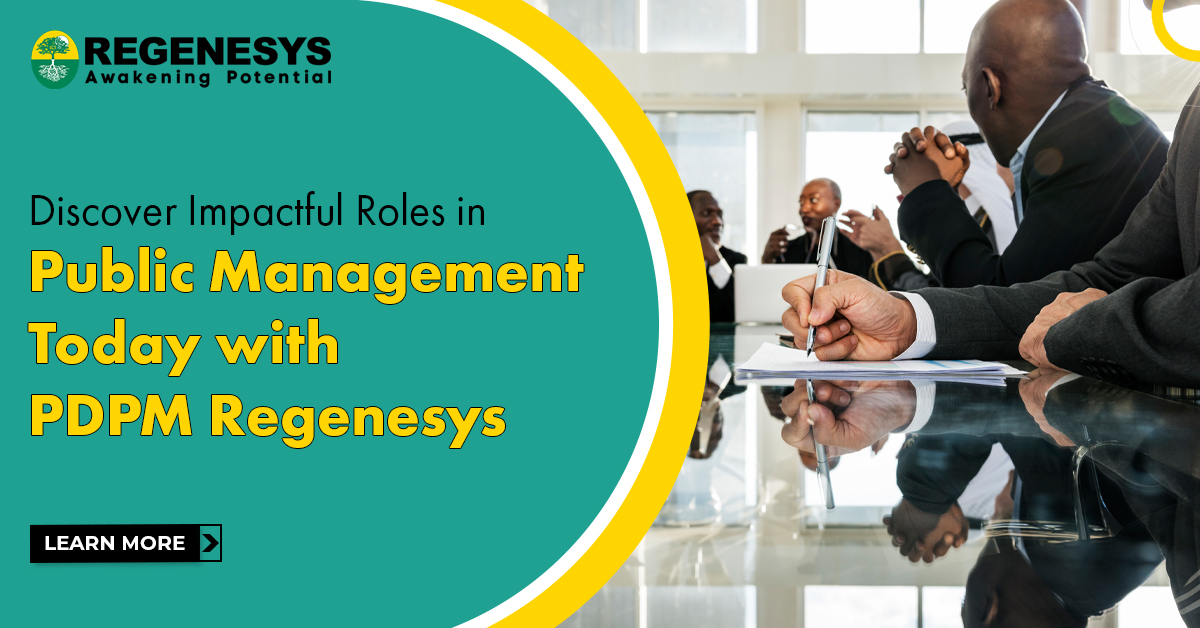In today’s dynamic landscape, effective public management stands as the bedrock of a well-functioning government. As policies shape the trajectory of nations, the role of skilled professionals becomes paramount. A Postgraduate Diploma in Public Management (PDPM) stands at the forefront, moulding adept individuals capable of influencing and implementing impactful government policies.
Table of Contents
- The Crucial Role of PDPM in Policy Enhancement
- Driving Change in Governmental Spheres
- Career opportunities after PDPM
- Regenesys: Fostering Future Leaders in Public Management
- FAQS
The Crucial Role of PDPM in Policy Enhancement
- Understanding Policy Dynamics
A PDPM equips individuals with an in-depth understanding of policy formulation, analysis, and evaluation. This knowledge is instrumental in discerning the impact of policies on society, economy, and governance structures.
- Strategic Decision-Making
Professionals with a PDPM possess the skills to make informed decisions based on thorough policy assessments. They analyse data, consider societal implications, and propose strategies to improve policy effectiveness.
- Implementing Change
The impact of a PDPM extends beyond theory. Graduates are equipped to drive change by implementing innovative policies that address societal challenges, fostering growth and inclusivity.
Driving Change in Governmental Spheres
- Public Policy Analyst
PDPM graduates often assume roles as policy analysts. They evaluate existing policies, conduct research, and propose reforms aligned with societal needs and governmental objectives.
- Policy Advisor
Advisory roles within government bodies require professionals well-versed in policy formulation and analysis. PDPM holders offer valuable insights to shape effective policies.
- Government Programme Managers
Professionals with a PDPM often manage governmental programmes, ensuring their alignment with policy objectives, efficient resource allocation, and successful implementation.
Career opportunities after PDPM
A Postgraduate Diploma in Public Management opens doors to diverse and impactful career opportunities within the public sector. Graduates with a PDPM find themselves equipped to embark on roles as policy analysts, advisors, programme managers, and government relations specialists. These professionals play pivotal roles in evaluating, formulating, and implementing policies that shape communities and drive societal change. The qualification also positions individuals for careers in research institutions, think tanks, and strategic planning roles, offering opportunities to contribute to policy-oriented research and development. A PDPM, with its emphasis on strategic decision-making and policy analysis, paves the way for a rewarding career trajectory in governmental organisations, NGOs, and public service entities, making a tangible difference in society’s well-being and progress.
-
Policy Analyst:
- Role: Evaluate existing policies, conduct thorough research, and propose recommendations for policy improvements.
- Responsibilities: Analyse policy effectiveness, assess societal impact, and suggest reforms aligned with governmental objectives. Prepare policy briefs and reports for decision-makers.
-
Policy Advisor:
-
-
- Role: Provide expert advice and recommendations on policy matters to government bodies or officials.
- Responsibilities: Offer insights on policy formulation, implications, and potential strategies for effective implementation. Advise on policy alignment with societal needs and government goals.
-
-
Programme Manager in Government Departments:
-
-
- Role: Oversee and manage governmental programmes or initiatives.
- Responsibilities: Ensure programme alignment with policy objectives, efficient resource allocation, and successful implementation. Monitor progress, assess impact, and make strategic adjustments as needed.
-
-
Government Relations Specialist:
-
-
- Role: Foster relationships between government entities and external stakeholders.
- Responsibilities: Engage with various stakeholders, including NGOs, private entities, and community groups. Facilitate communication, negotiate partnerships, and advocate for policies aligned with governmental goals.
-
-
Public Affairs Officer:
-
-
- Role: Represent governmental bodies in public communications and relations.
- Responsibilities: Communicate government policies to the public, address concerns or inquiries, and manage public perception of policies. Draft press releases, speeches, or official statements.
-
-
Strategic Planner in Public Sector Organisations:
-
-
- Role: Develop long-term strategies and plans for public sector entities.
- Responsibilities: Conduct research, analyse data, and formulate strategic plans aligned with governmental objectives. Assess potential impacts and risks, and propose adaptive strategies.
-
-
Research Analyst in Think Tanks or Research Institutions:
-
- Role: Conduct policy-oriented research and analysis.
- Responsibilities: Analyse policy trends, evaluate their impact, and contribute to reports or studies. Provide insights and recommendations to inform policy formulation.
Regenesys: Fostering Future Leaders in Public Management
At Regenesys School of Public Management, the PDPM programme empowers individuals to become drivers of change in governmental spheres. The curriculum focuses on fostering critical thinking, analytical skills, and strategic decision-making—integral aspects in shaping impactful government policies.
The PDPM offered by Regenesys prepares individuals to lead transformational initiatives, influencing policy directions that impact communities positively.
To explore more about the PDPM programme and Regenesys’ commitment to developing competent professionals in public management, visit Regenesys’ PDPM programme page. Discover how pursuing education with Regenesys can carve a path towards influential roles in governmental policy-making.
FAQ
Q1: What career paths can I pursue after completing a PDPM?
A1: Graduates of a PDPM can explore roles such as policy analyst, policy advisor, programme manager, government relations specialist, strategic planner, or research analyst in governmental bodies, NGOs, research institutions, and more.
Q2: Can a PDPM help me advance my career in the public sector?
A2: Absolutely. A PDPM equips individuals with the necessary skills in policy analysis, strategic planning, and decision-making, positioning them for advancement in public sector careers and influential roles.
Q3: Are there opportunities for specialisation or further studies after a PDPM?
A3: Yes, graduates can pursue specialised areas like public policy, governance, international relations, or further academic qualifications such as a Master’s degree or doctoral studies in related fields.
Q4: How does a PDPM contribute to societal impact and community development?
A4: Professionals with a PDPM play pivotal roles in shaping government policies that directly impact communities. Their expertise in policy analysis and strategic planning contributes to societal welfare and progress.
Q5: What skills are essential for careers after completing a PDPM?
A5: Skills such as critical thinking, policy analysis, effective communication, strategic planning, research, and leadership acquired during a PDPM are crucial for success in various roles within the public sector.
Q6: Can a PDPM lead to opportunities outside the public sector?
A6: Yes, the skill set acquired during a PDPM is transferable and valuable across sectors, potentially opening doors to roles in consulting, research, or policy-oriented positions in various industries beyond the public sector.







